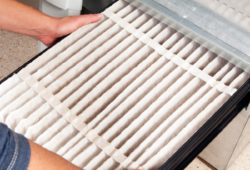What Excess Window Condensation Could Mean to Your Raleigh Home
When you see excess window condensation in your home, that’s typically a red flag indicating there’s too much moisture is in the air, not a problem with the windows themselves. In a typical home, windows are the easiest place to see moisture condensing on surfaces. But that doesn’t mean condensation isn’t happening on other surfaces as well.

What Causes Excess Window Condensation?
When condensation occurs on windows during the winter, it’s confirmation of a basic scientific principle: warmer air has the ability to hold more moisture. As warm, moist air moves from the center of a room toward the walls and windows where it tends to be cooler, the air cools slightly. As it does, the air releases some of the moisture it’s carrying. That appears as condensation on the inside of windows.
Excess window condensation doesn’t just happen in the winter, however. Anytime the temperature variation is high enough between outside and inside, you can get condensation on windows. Also, in a home with poor humidity control in the summer, dampness from moist indoor air can coat everything including windows, though this isn’t condensation, strictly speaking.
Window condensation during the cooling season can occur when old windows have been replaced by energy-efficient models that restrict heat transfer between inside and outside. This sort of condensation signals that your windows are doing their job by creating an effective barrier between the indoors and outdoors.
Condensation on windows in the summer typically isn’t something to worry about, since the moisture is actually forming on the outside of the window rather than the inside. Being outside, this condensation doesn’t pose a threat to walls, window frames, doors, furniture and indoor air quality. And when it warms up outside, the moisture on the windows usually will disappear.
Reduce Relative Humidity
The prescription for excess window condensation in the winter is pretty straightforward; reduce humidity inside. Drier interior air won’t hold enough moisture to condense on windows. It’s important to realize, however, that air that’s too dry can have its own negative effects. These include health effects such as chapped lips, dry and flaky skin, and respiratory issues. Cold viruses and bacteria tend to become more communicable in dry air, since they stay airborne longer when not attached to water vapor. Annoying electrical shocks are common in dry air environments as well. Finally, furniture and wood fixtures can crack and warp when the air is too dry.
Whether you’re using a humidifier or a dehumidifier to control seasonal humidity conditions in your home, get one with a humidistat. This measures indoor relative humidity and can allow you to set a humidity level that’s not high enough to allow excess window condensation or low enough to make the air too dry. If you have a newer air conditioning system in your home, it likely will also dehumidify your air during regular operation.
Many homeowners also use a whole-house dehumidifier to lower humidity, mainly in the summer but in any season when your indoor air is getting too moist. The dehumidifier will prevent humid conditions that allow for excess window condensation. A portable dehumidifier will address situations when the humidity issues are confined to one room or level, such as a finished basement or laundry room.
Make sure you have exhaust fans in rooms that tend to harbor muggy air, such as bathrooms, the laundry room and kitchen. They should exhaust the humid air outside. Various ventilation systems that provide an effective exchange of air between inside and outside also will help reduce indoor humidity. This is especially the case with energy recovery ventilators (ERVs) that actually transfer moisture to outflowing air in the summer, and into dry inflowing air in the winter. The dryer needs to be vented to the outside; otherwise, it will route moist air back inside.
Other tactics to reduce indoor humidity include ensuring that attic vents are unobstructed and that the basement is properly sealed and insulated. Try simply opening windows a crack in the winter for a quick infusion of fresh air.
Learn more about dealing with excess window condensation, as well as other indoor air quality solutions available from Air Experts, or contact us today at 919-480-2727.
Image Provided by Shutterstock.com




